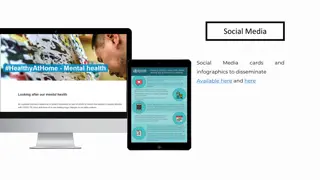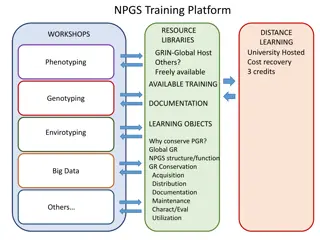
Guide to Mobile User Experience Design: Adaptive vs. Responsive
Learn about the differences between adaptive and responsive design for mobile user experiences. Explore resources, insights, and challenges related to design choices, performance, and optimizing mobile configurations.
Download Presentation

Please find below an Image/Link to download the presentation.
The content on the website is provided AS IS for your information and personal use only. It may not be sold, licensed, or shared on other websites without obtaining consent from the author. If you encounter any issues during the download, it is possible that the publisher has removed the file from their server.
You are allowed to download the files provided on this website for personal or commercial use, subject to the condition that they are used lawfully. All files are the property of their respective owners.
The content on the website is provided AS IS for your information and personal use only. It may not be sold, licensed, or shared on other websites without obtaining consent from the author.
E N D
Presentation Transcript
The complete guide to Designing Mobile User Experiences 5) Adaptive or Responsive? Resources @shoobe01 4ourth.com 1
Adaptive or Responsive? Read More: Device detection especially is worth looking into and I encourage you to read up on that more. If you think you need some arguments for your team that pure RWD is bad, check out the articles on bloat, and Brad Frost's excellent deck on Adaptive design, especially. 2
Responsive Design May Be Driving Your Readers Away http://www.econtentmag.com/Articles/News/News-Feature/Responsive- Design-May-Be-Driving-Your-Readers-Away-102855.htm BONUS new since the presentation was recorded. Includes some numbers from surveys, reviews of performance, etc. which prove that the slow speed of responsive hurts your site. Mostly around images, so at least read up below on responsive image solutions. 3
Select your mobile configuration https://developers.google.com/webmasters/mobile-sites/mobile- seo/overview/select-config BONUS new since the presentation was recorded. This has confused some people. Google seems to say RWD first, and calls DDR- based adaptive dynamic serving (which no one else does). They also put red check boxes, and make assumptions so it s skewed badly. On, and no one does separate-site anymore so why is it on the chart? Don t get too confused by this. Read the rest of these articles and make up your own mind. 4
Responsive Web Design http://alistapart.com/article/responsive-web-design The first one. If you never read Ethan Marcotte s 2010 article, you really should. 5
RWD Bloat http://daverupert.com/2014/07/rwd-bloat/ What it got us, more than anything I sometimes think, is bloat. The size of all traffic on the internet has increased markedly. This goes into detail and decides you get around 10% extra junk just from being responsive at all, and tries to talk around how to optimize your site. Not everyone does this, but please do try. 6
The "Average Page" is a myth https://www.igvita.com/2016/01/12/the-average-page-is-a-myth/ The title is because the author is being pedantic about what average means, but it s all the same thing as the previous slide: page size is climbing, badly. Now from this you can get some really neat data, and what I get from it is that average page size is huge due to some bad outliers. What to take from that? Well, don t be that guy. Presumably, much more of the internet than those few is modern and high tech but remains manageable or small. Set your target sizes (as acceptance criteria for download times) accordingly, and make the developers do a good job. 7
The Cost of Frameworks https://aerotwist.com/blog/the-cost-of-frameworks/ I recently delivered a talk at FFConf in Brighton, called "You should use <insert library / framework here>, it's the bestestest!". I wanted to do a write-up of the presentation's content here, hopefully so it can start a broader conversation that I think we need to have, mainly around the cost of modern frameworks on mobile devices. I don t get too far into code too much, but this is worth a long treatise sometime. I may write an article on how our over-reliance on frameworks makes things happen fast, but at the cost of being slow, unreliable, not what you wanted, and it takes a lot of time and money to make them work. 8
You dont want to hire me http://www.michielbijl.nl/2016/01/11/you-dont-want-to-hire-me/#main My point is that in the ten years of my career I ve never once worked for a company that really cared about their end result I believe we as developers want to, and indeed need to, value our craft and projects we create. We all want to create beautiful things, and most of us do just that. I would very much like it if all those beautiful creations out there would work for all humans. The same topic, wanting to make sure we use JS the right way, and maybe getting back to server side code for dyanmic runtime rendering. 9
How many floppy disks do you need to fit an article from The Atlantic? https://medium.com/@pete/how-many-floppy-disks-do-you-need-to-fit-an- article-from-the-atlantic-8924a9e057ff#.t1qmms5kq By the time Safari had crashed, I d logged 21MB of ads, pixels, and associated scripts that had been downloaded onto my phone. If the main idea was to heat my phone so my hand could stay warm against the San Francisco fall, nice job everybody! Not that you can t make a bad website without frameworks. The time it takes to load the site (or for the user to abandon it) is part of their experience. Design it, and remember the user every time you add something. 10
Device Detection http://4ourth.com/wiki/Device%20Detection I couldn t find a good overview of device detection, for the non-nerd at least, so I had Luca Passani (the inventor of WURFL) write one up for me. If you want more after reading it, there are plenty of links provided, even to competitors of his. 11
Beyond Squishy: The Principles of Adaptive Design http://www.slideshare.net/bradfrostweb/beyo nd-squishy-the-principles-of-adaptive-design- 17070713 This is Brad Frost s excellent deck on adaptive design. I can t say enough good about this. The Many Faces of Adaptive Design http://bradfrostweb.com/blog/post/the-many- faces-of-adaptive-design/ If you prefer words to slides, this is a pretty good article along the same lines. 12
Responsive principles: More than designing for size http://www.slideshare.net/shoobe01/responsive-principles A deck of mine about using the principle of responding (later, I realized that this was called Adaptive) to make better apps and services. 13
Server-Side Device Detection: History, Benefits And How-To http://mobile.smashingmagazine.com/2012/09/24/server-side-device- detection-history-benefits-how-to/ Pretty much exactly what it says, a how to guide. It s light to inaccurate on the history, but gets to code examples and architecture. So, if you wonder what is involved in implementing this on your site, here s a good example. 14
RESS: Responsive Design + Server Side Components http://www.lukew.com/ff/entry.asp?1392 Not as buzzworthy these days, but a good attempt to make a specific principle around the use of client side software to do things as a result of server side device detection, but avoiding actually serving different templates. 15
Image replacement http://www.quirksmode.org/dom/fir.html A largely technical discussion (by PPK, who always knows how browsers work) on the need for and merits of responsive image tools. Instead of just resizing a giant image, optimizing images for each client, or class of them, is a way to make RWD more efficient. 16
Scalable Inman Flash Replacement http://en.wikipedia.org/wiki/Scalable_Inman_Flash_Replacement Not super relevant today, but since I mentioned sIFR I figure I should include the reference. 17
Which responsive images solution should you use? http://css-tricks.com/which-responsive-images-solution-should-you-use/ More on responsive images. This is getting old, but I am not aware of a newer one that is as comprehensive. So start here and then read newer topics to see how the state of the art has changed. 18
Responsive Images http://blog.cloudfour.com/responsive-images-part-10-conclusion/ Jason Grigsby wrote a ten part treatise on the principles and practice of responsive images in mid/late 2015. Should be up to date for a bit. You may note how I didn t actually talk about these much in the video, and that s because it s crazy complex, and at the principle level some of the best solutions are pretty adaptive. Shhh. Don t tell anyone as they love calling it all responsive still. Seriously, if you bring this up, it makes people nervous and they might not do it, so be careful what you say. 19
Server-side device detection used by 82% of Alexa top 100 sites http://mobiforge.com/designing/blog/server-side-device-detection-used-82- alexa-top-100-sites The classic study (repeated periodically, and proven elsewhere) that: 82% of the Alexa 100 top sites use some form of server-side device detection to serve content on their main website entry point. As you descend from the top 10 to the top 25 and top 100 sites the percentage of sites using server-side detection falls from 100% to 96% to 82%. This even came up the other day. A client couldn t find any competitors or related sites that were responsive. Adaptive is for making money in my book. 20
Should Your Website Be Using Adaptive Design? http://blogs.hbr.org/2013/07/should-your-website-be-using-a/ BONUS new since the presentation was recorded. But, responsive design isn t the end of the road. It addresses layout problems but doesn t solve important issues, like mobile performance and device customization. To create truly great mobile web experiences we need to go beyond responsive layouts to fully interactive and functional websites. Basically, yes. Don t just be responsive. 21
What browser are you designing for? As part of the MOVR report here: http://www.scientiamobile.com/page/movr-mobile-overview-report Jon Arne noticed that stock browsers were not used nearly as much as you d expect. Building for Android? Better not just use Chrome to test! Buy a Samsung and try it with intents, too! 22
Android, iOS, and Samsung? http://www.businesswire.com/news/home/20161116005308/en/Report- Shows-720x1280-Smartphone-Screen-Resolution More proof of the previous slide now, and all the way to: Samsung Browser is now the third most used mobile browser worldwide, after Safari and Chrome Mobile Third! Dominant platforms do that. How long till we see strong numbers for whatever the HuaWei browser is? Are you testing your website on all these? You better be. They aren t all the same at all. 23






















